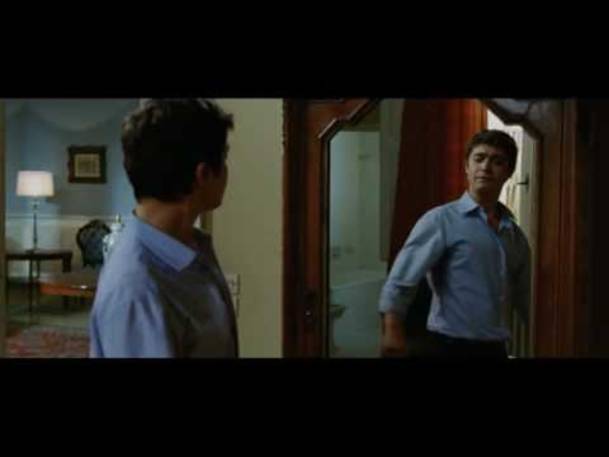


As the so-called culture wars of the past few decades have shown, “the family” is an ideological construct – and political weapon – as much as it is a social arrangement. American conservatives don’t much like public policies that would actually strengthen families stressed by economic woes, but they love to preach about “family values” and to condemn those – gays and lesbians, feminists, leftists – whom they view as “anti-family.”
In Italy, the Vatican and its allies on the political right and center-left follow a similar script,insisting that the State uphold – and enforce -- conservative Catholic values about family and sexuality. Hardly a day goes by that some bishop isn’t denouncing attempts to give legal recognition to same-sex couples as an attack on the sacrosanct family, and that some opportunistic politician isn’t applauding that bishop.
So when a popular Italian filmmaker presents a different view of family values, one that challenges conservative and Catholic ideology, it’s a culturally significant event. Ferzan Ozpetek, the openly gay, Turkish-born director who calls himself “Italian by adoption,” has done just that with his latest film, Mine vaganti (Loose Cannons). But the film, which opens in Italy this month, also challenges the belief, once foundational to feminism and gay liberation, that the family is inherently oppressive, a domestic dictatorship.
The British poet Philip Larkin famously wrote, “They fuck you up, your mum and dad. They may not mean to, but they do.” Mine vaganti, while acknowledging that families can do damage, asserts that for gay children, familial bonds can be nurturing -- even liberating.
Or at any rate, that the ties of blood and love are too tenacious to be easily severed.
Mine vaganti centers on the bourgeois Cantone family, owners of a pastificio (pasta factory) in the southern Italian city of Lecce. The youngest son, Tommaso (played by Riccardo Scamarcio, currently one of Italy’s most popular romantic leads), returns from his studies in Rome. He confesses to his brother Antonio that he has been studying literature in order to become a writer, rather than business, as his family believed. He also tells Antonio that he is gay, and that he intends to come out to the rest of the family. But that evening, at dinner, Antonio trumps him by announcing to la famiglia – parents, grandmother, aunt, sister and Tommaso -- that he is gay, and that his lover is one of the employees of the family pastificio.
The shocked and infuriated patriarch Vincenzo suffers a heart attack. Tommaso must put his own revelations on hold and take over the family business, something he has been trying to escape his entire life. Besides assuming this unwanted responsibility, he has to deal with the fallout from Antonio’s unexpected disclosure, including gossipy neighbors, and confront his parents’ prejudices. And then three of his gay friends arrive from Rome, complicating matters further.
Ozpetek’s recent films have been somber, even melodramatic. But, according to Italian and European critics, Mine vaganti is in the tradition of commedia all’italiana, a genre whose best films seamlessly blended comedy and incisive social commentary. (The film was shown at the Berlin Film Festival in February.)
One critic, however, compared Ozpetek’s film to the work of another European auteur. In the online journal Screendaily.com, Lee Marshall wrote, “With its themes of family secrets, oddball character parts, bittersweet tone and sunny outlook, this is the easily the most Almodòvar-esque of all Ozpetek’s films.”
In several of the director’s earlier works, like Hammam (also known as Steam) and Le Fate ignoranti (released abroad as His Secret Life), gays and lesbians are estranged from their families of origin and often marginalized by societal bigotry. They form new families with each other. But as Ozpetek said in a recent interview, “After my father’s death, I started to look at relations between parents and children in a new light.” In Mine vaganti, the gay sons don’t flee their family; the battles for understanding and acceptance are waged on the home turf.
Ozpetek, who co-wrote the screenplay with Ivan Cotroneo, says the film’s theme “isn’t homosexuality but the parent-child relationship, and the difficulty of self-knowledge and self-acceptance. The focus is on a family that I know – I always start from personal experiences. It’s a family from the provinces, Lecce in the film, but it could be in any town in the world.”
But the film is indeed set in Italy, and in the south, where conservative attitudes towards family and sexual morality purportedly prevail. Homophobia, though, is hardly limited to any one part of the bel paese. The north and center have seen their share of anti-gay politics and violent hate crimes. One of the film’s stars, Ennio Fantastichini, who plays Vincenzo Cantone, views Mine vaganti as a very Italian story.
“I, too, as a father, would like to see this country change,” he said, “so that it is no longer preoccupied with people’s sexual orientations or religious beliefs, which in my opinion are private matters, and that we should get back to understanding that the world is full of people who are more or less wonderful, more or less intelligent, and, above all, that the main question you should ask your children is, ‘are you happy’ or ‘are you unhappy’?”
Federico Brusadelli, a writer for the online magazine FareFuturo, said Fantaschini’s comments were a breath of fresh air “in a country that continues to brandish ‘The Family’ as a weapon of war, too often forgetting that The Family, in uppercase, doesn’t exist. There are instead many families…and whether they are married or living together, homosexual or heterosexual, would, in a more normal country, matter very little.”
Mine vaganti (Loose Cannons) was produced by Fandango in collaboration with Rai Cinema. It opens in Italy on March 12, 2010. Plans for U.S. distribution have yet to be announced.
Source URL: http://iitaly.org/magazine/focus/art-culture/article/whose-family-values
Links
[1] http://iitaly.org/files/mine-vaganti-teaser